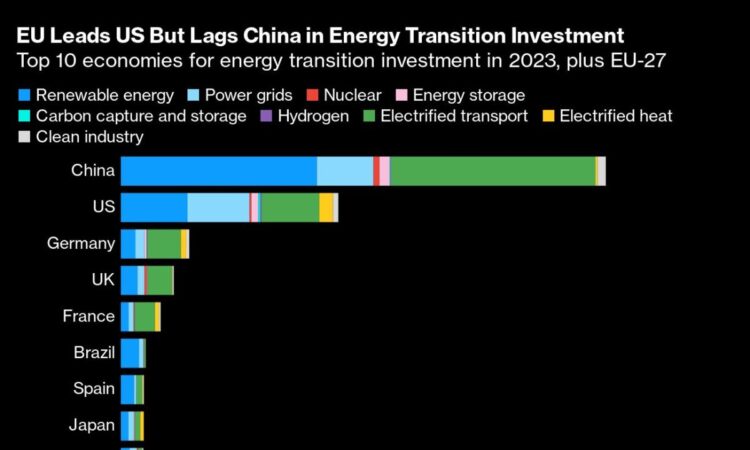
(Bloomberg) — Federal Reserve Chair Jerome Powell signaled US central bankers will wait longer to cut borrowing costs following a series of surprisingly high inflation readings, which reduces room for easier policy around the world.
Most Read from Bloomberg
Global finance chiefs convening in Washington for the International Monetary Fund-World Bank spring meetings are sweating the strength of the US economy, as elevated interest rates and a strong dollar force other currencies lower and complicate plans to bring down borrowing costs.
Meanwhile, an escalation of the conflict in the Middle East is raising concerns of a wider regional war that could send oil prices over $100 a barrel.
Here are some of the charts that appeared on Bloomberg this week on the latest developments in the global economy, geopolitics and markets:
World
The high tide for global interest rates has passed, but respite for the world economy may be limited as policymakers stay wary at the threat of inflation. Powell’s latest pivot creates a quandary for central bankers around the world.
The IMF inched up its expectations for global economic growth this year, citing strength in the US and some emerging markets, while warning the outlook remains cautious amid persistent inflation and geopolitical risks.
The increasingly hopeful economic story of 2024 so far is that of a world headed for a soft landing. Unfortunately that same world is also becoming more dangerous, divided, indebted and unequal.
US
US retail sales rose by more than forecast in March and the prior month was revised higher, showcasing resilient consumer demand that keeps fueling a surprisingly strong economy. So-called control-group sales — which are used to calculate gross domestic product — jumped by the most since the start of last year.
As President Joe Biden this week hailed America’s booming economy as the strongest in the world during a reelection campaign tour of battleground-state Pennsylvania, global finance chiefs convening in Washington had a different message: cool it. While the world’s largest economy is helping support global growth, it also means the US is “slightly overheated,” the IMF’s Kristalina Georgieva said — thanks in part to Washington’s fiscal stance, with the budget gap pushing toward 7% of GDP.
Emerging Markets
Israel reportedly struck back at Iran on Friday morning, following days of frantic diplomacy from the US and European nations in which they tried to convince Israeli Prime Minister Benjamin Netanyahu not to respond too aggressively, if at all, to the Iranian attack. Their main concern is to avoid a wider war in a region already roiled by the Israel-Hamas conflict and which could send oil prices above $100 a barrel.
India forecast an above-normal monsoon this year, raising optimism that ample rains will spur crop output and economic growth, as well as prompt the government to ease curbs on exports of wheat, rice and sugar. Forecast of a normal monsoon bodes well for easing food costs, and headline consumer price inflation eventually, said Anubhuti Sahay, head of economic research, South Asia, at Standard Chartered Plc.
Europe
European Commission President Ursula von der Leyen is unleashing a barrage of trade restrictions against China as she seeks to follow through on a pledge to make the EU a more relevant political player on the global stage. It’s in the area of clean tech where the EU is most fervently fighting to stave off competition from cheap Chinese imports of everything from EVs to solar panels.
UK inflation slowed less than expected last month as fuel prices crept higher, prompting traders to further unwind bets on how many interest rate cuts the Bank of England will deliver this year.
Asia
China reported faster-than-expected economic growth in the first quarter – along with some numbers that suggest things are set to get tougher in the rest of the year. Gross domestic product climbed 5.3% in the period, accelerating slightly from the previous quarter and beating estimates. But much of the bounce came in the first two months of the year. In March, growth in retail sales slumped and industrial output fell short of forecasts, suggesting challenges on the horizon.
–With assistance from John Ainger, Irina Anghel, Enda Curran, Shawn Donnan, James Hirai, Rajesh Kumar Singh, John Liu, Lucille Liu, Eric Martin, Alberto Nardelli, Tom Orlik (Economist), Pratik Parija, Zoe Schneeweiss, Craig Stirling and Fran Wang.
Most Read from Bloomberg Businessweek
©2024 Bloomberg L.P.






